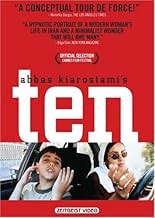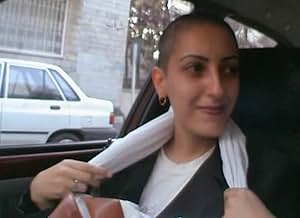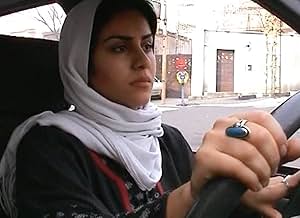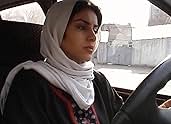VALUTAZIONE IMDb
7,4/10
8901
LA TUA VALUTAZIONE
Un'indagine sociale nella forma di dieci conversazioni tra una donna che guida e i vari ospiti e passeggeri di lei.Un'indagine sociale nella forma di dieci conversazioni tra una donna che guida e i vari ospiti e passeggeri di lei.Un'indagine sociale nella forma di dieci conversazioni tra una donna che guida e i vari ospiti e passeggeri di lei.
- Regia
- Sceneggiatura
- Star
- Premi
- 1 vittoria e 4 candidature totali
Amina Maher
- Amin
- (as Amin Maher)
Roya Akbari
- Prostitute + Lover
- (as Roya Arabshahi)
Recensioni in evidenza
The front-page review of this film simply doesn't do this marvelous film justice. Renowned Iranian film-maker Abbas Kiarostami takes an innovative approach at giving us a very deep glimpse not only into the life of mother and child, but also into Iran, its society and the situation of women transitioning to a more assertive role in society (however, I don't think one should be confused that the issues women face in Iran are not relevant to women elsewhere in the world, including the West).
The film has two fixed camera angles, one giving us a view of the driver-side and the other a view of the passenger side of an automobile. The driver is a mother who has left her husband and now resides with her new lover (she is the common thread in all ten "episodes"). Each sequence places a different person in the passenger seat, with particular emphasis on her son (who rides in four of the 10 scenes, if I'm not mistaken).
It is this mother-son relationship that is at the crux of the film, and for good reason. The performances of these two characters was nothing short of amazing. The boy in particular, with every eye-twitch, frown, smile, and outburst was able to convey a frighteningly realistic portrayal of a boy who is all at once obstinate, angry, disrespectful, and immature, yet still sweet and somewhat an innocent victim of the situation. He is unforgiving to his mother for walking out on him and "breaking up the family" and is reluctant to accept any explanation his mother offers. They trade barbs and though the love is there, you can see the seeds already planted in the young adolescent of a society that subordinates women to their male partners. Here, it is so profound that even a pre-teen lectures his mother on right and wrong.
The mother bounces back and forth between defending herself to accepting blame, showing the cracks of guilt that clearly lie beneath her composed and beautiful surface. And it's a beauty that her son can't recognize: she's a sexy passionate woman with needs of not just a mother but also as a lover and a liver; but like all children he can only see her as an adult and a mother.
The other key character involves a friend who desperately seeks a life partner, but finds herself unsuccessful at every turn. Most recently, a man she has been seeing tells her that he cannot marry her because he does not love her. She coyly reveals from under her veil that in her grief she has shaved her head completely. This act is astonishing not because it is defiant but because it is terribly charming. She can't offer an explanation as to why she has done it, but no explanation is necessary. Who hasn't at some time when an ego has been made fragile by rejection, sought to change hair, clothing, face, self? And it is with this scene, with veil pulled back, that the woman's beauty is uncovered, not because we see her hair or her bald head, but because of the insight the shaving act gives to her character, and her innocent embarrassment brings a smile to her tear-stained face that lights up the screen.
I give the film a 9 and not a 10 because of one sequence involving a conversation with a prostitute in the passenger seat. Presumably the driver has given a ride to hitch-hiker, leading to an intelligent conversation/debate about the world's oldest profession. But this scene seemed a little out-of-place, contrived, and added little to the more general theme of the rest of the film. This one slip-up notwithstanding, "Ten" is a creative and wonderful experience for film lovers who seek something out of the ordinary. And it has a final scene which punctuates the film perfectly.
The film has two fixed camera angles, one giving us a view of the driver-side and the other a view of the passenger side of an automobile. The driver is a mother who has left her husband and now resides with her new lover (she is the common thread in all ten "episodes"). Each sequence places a different person in the passenger seat, with particular emphasis on her son (who rides in four of the 10 scenes, if I'm not mistaken).
It is this mother-son relationship that is at the crux of the film, and for good reason. The performances of these two characters was nothing short of amazing. The boy in particular, with every eye-twitch, frown, smile, and outburst was able to convey a frighteningly realistic portrayal of a boy who is all at once obstinate, angry, disrespectful, and immature, yet still sweet and somewhat an innocent victim of the situation. He is unforgiving to his mother for walking out on him and "breaking up the family" and is reluctant to accept any explanation his mother offers. They trade barbs and though the love is there, you can see the seeds already planted in the young adolescent of a society that subordinates women to their male partners. Here, it is so profound that even a pre-teen lectures his mother on right and wrong.
The mother bounces back and forth between defending herself to accepting blame, showing the cracks of guilt that clearly lie beneath her composed and beautiful surface. And it's a beauty that her son can't recognize: she's a sexy passionate woman with needs of not just a mother but also as a lover and a liver; but like all children he can only see her as an adult and a mother.
The other key character involves a friend who desperately seeks a life partner, but finds herself unsuccessful at every turn. Most recently, a man she has been seeing tells her that he cannot marry her because he does not love her. She coyly reveals from under her veil that in her grief she has shaved her head completely. This act is astonishing not because it is defiant but because it is terribly charming. She can't offer an explanation as to why she has done it, but no explanation is necessary. Who hasn't at some time when an ego has been made fragile by rejection, sought to change hair, clothing, face, self? And it is with this scene, with veil pulled back, that the woman's beauty is uncovered, not because we see her hair or her bald head, but because of the insight the shaving act gives to her character, and her innocent embarrassment brings a smile to her tear-stained face that lights up the screen.
I give the film a 9 and not a 10 because of one sequence involving a conversation with a prostitute in the passenger seat. Presumably the driver has given a ride to hitch-hiker, leading to an intelligent conversation/debate about the world's oldest profession. But this scene seemed a little out-of-place, contrived, and added little to the more general theme of the rest of the film. This one slip-up notwithstanding, "Ten" is a creative and wonderful experience for film lovers who seek something out of the ordinary. And it has a final scene which punctuates the film perfectly.
Yes, it's a gimmick: the entire film is shot from the dashboard of a car, and only the driver and the passenger are heard and (sometimes) seen. This gimmick will not please everyone, and hardly qualifies the film as a masterpiece. But Hitchcock's brilliant "Rear Window" was a gimmick too, and Kiarostami's "10" is no less worthy of attention. A movie has to be done well, regardless of its tricks, and "10" fits the bill. The driver of the car also drives the conflict; she is a recently divorced Iranian woman in a country in which women barely have the right to divorce at all. As the city rushes past--it's great fun to watch the people and places outside--she curses the drivers and pedestrians along the way but holds her own against the crises in the passenger's seat. Funny thing about a car: it gives one the sense of control (here, that's clearly an illusion) and the oxymoronic ability to remain private even while out in public. She and her women passengers air their grievances within this zone of safety; a scene in which a passenger slowly removes her head covering, a symbol of repression, is moving and unsettling. The greatest conflict, however, is between the driver and her young son, who's bitter about the divorce and lets his mother unravel until he, not she, controls where the car is heading. The boy's performance is astonishingly real, as much for the way he fills the silences as for his sharp and sometimes humorous counterpoints. The film could have done without the "countdown" of the 10 conversations--the source of the title--but no matter: everything in between is a delight.
8 out of 10
8 out of 10
I saw this in memory of Abbas Kiarostami who passed away the other day, this Sufi seer of transient, evanescent life that circles back and goes out again like fireflies in the night. I have felt him so close in spirit; it was one of the saddest losses in recent years.
My relationship with him is rather simple and uncluttered, much like the films he makes. Shucks about form and whether the camera moves or not as far as I'm concerned. It's a tool to create stillness so that simple gestures will ring wide; but you can't still the mind of a viewer who has a million thoughts running in his head while watching, and you can't prevent a viewer who wants to remain still by moving the camera.
And I urge you as always to not settle for receiving films, his or anyone else's, as only cultural items that were made for us to intellectualize and keep up to date with norms of life in faraway places. It can make for interesting post-viewing discussion, but most of all, make sure to know things privately in your own self, allow them to have their cosmic import that speaks about the fact that here you are, living a life that will last a little while more.
A woman drives around Tehran, having conversations with people on the passenger's seat during a day and a night, this is the whole story here. We never leave the car. The camera simply flits between shots of the driver and passenger.
By way of insights, you will glean several here, about the place of women in Iran, expectations of being a housewife and how hard it is to obtain a divorce. Religion as focal point. You might consider that her unruly son who constantly berates her is promulgating larger social attitudes at play; a far more eyeopening way than showing us an angry mullah. You will get to decide how much of all this echoes your own society.
But now, how about we allow it to simply be about a woman who drives around life that wells up around her with anxieties?
A life that breaks down around the edges, as all lives do. A marriage that didn't work out and a son that pushes himself away from her. A man and woman who wanted different things from life and parted ways. You might appreciate here that the man allowed himself to be painted as drug user before the court as the only way for her to get the divorce.
Parallel, possible lives materialize in the seat next to her. A sister who is going through a breakup she has already gone through; how hopeless it is to cling to love that isn't there. Another woman whose marriage was broken off at the last moment. A prostitute who scoffs at the conventions of marriage. An old woman on her way to the mosque.
It ends with a son who is growing up to be a man and she has to softly let go into life. It isn't just a social film, but you'll have to allow yourself to watch from a softer distance. Kiarostami does it here, bestows the gift of wisdom. In the right ears, it will be a sutra teaching us impermanence and non-attachment.
My relationship with him is rather simple and uncluttered, much like the films he makes. Shucks about form and whether the camera moves or not as far as I'm concerned. It's a tool to create stillness so that simple gestures will ring wide; but you can't still the mind of a viewer who has a million thoughts running in his head while watching, and you can't prevent a viewer who wants to remain still by moving the camera.
And I urge you as always to not settle for receiving films, his or anyone else's, as only cultural items that were made for us to intellectualize and keep up to date with norms of life in faraway places. It can make for interesting post-viewing discussion, but most of all, make sure to know things privately in your own self, allow them to have their cosmic import that speaks about the fact that here you are, living a life that will last a little while more.
A woman drives around Tehran, having conversations with people on the passenger's seat during a day and a night, this is the whole story here. We never leave the car. The camera simply flits between shots of the driver and passenger.
By way of insights, you will glean several here, about the place of women in Iran, expectations of being a housewife and how hard it is to obtain a divorce. Religion as focal point. You might consider that her unruly son who constantly berates her is promulgating larger social attitudes at play; a far more eyeopening way than showing us an angry mullah. You will get to decide how much of all this echoes your own society.
But now, how about we allow it to simply be about a woman who drives around life that wells up around her with anxieties?
A life that breaks down around the edges, as all lives do. A marriage that didn't work out and a son that pushes himself away from her. A man and woman who wanted different things from life and parted ways. You might appreciate here that the man allowed himself to be painted as drug user before the court as the only way for her to get the divorce.
Parallel, possible lives materialize in the seat next to her. A sister who is going through a breakup she has already gone through; how hopeless it is to cling to love that isn't there. Another woman whose marriage was broken off at the last moment. A prostitute who scoffs at the conventions of marriage. An old woman on her way to the mosque.
It ends with a son who is growing up to be a man and she has to softly let go into life. It isn't just a social film, but you'll have to allow yourself to watch from a softer distance. Kiarostami does it here, bestows the gift of wisdom. In the right ears, it will be a sutra teaching us impermanence and non-attachment.
"Ten" makes the third Iranian film I have seen. I was very impressed with the last two I saw and so I decided to see this one and I was not disappointed.
Abbas Kiarostami gives "reality tv" (movie ?) a whole new meaning by having a mini camera installed on the dashboard of a car to video tape what appears to be a woman's daily driving routine.
There are ten segments that are video taped (hence the title of the movie) as she drives to and from her daily activities.
First off, we get to see her and her son, Amin, discussing her divorce from Amin's father and how displeased Amin is with the fact that they divorced. Amin, of course, is bitter, as most children are who have had to live thru a divorce. He desperately wants to go live with his father.
Two more times throughout the movie we see Amin and his mother furthering their discussion and we get to see how their relationship continues to deteriorate.
Amin's mother and her sister are seen in one segment discussing Amin and his behavior and the aunt even gives her opinion that it might be better for the boy to go live with the father on a full time basis for a while.
We also see Amin's mother give an old lady a lift to a mauseliam so the old lady can go do her religious rituals.
Amin's mother also gives a lift to a hooker and talks with her for a while in hopes to get her to chose a different life.
All in all, the movie shows a deeply sensitive woman who wants to help others and be there for her son while being her own person.
It's truly a heart felt movie to see how caring she is even though her relationship with her son appears doomed.
Abbas Kiarostami gives "reality tv" (movie ?) a whole new meaning by having a mini camera installed on the dashboard of a car to video tape what appears to be a woman's daily driving routine.
There are ten segments that are video taped (hence the title of the movie) as she drives to and from her daily activities.
First off, we get to see her and her son, Amin, discussing her divorce from Amin's father and how displeased Amin is with the fact that they divorced. Amin, of course, is bitter, as most children are who have had to live thru a divorce. He desperately wants to go live with his father.
Two more times throughout the movie we see Amin and his mother furthering their discussion and we get to see how their relationship continues to deteriorate.
Amin's mother and her sister are seen in one segment discussing Amin and his behavior and the aunt even gives her opinion that it might be better for the boy to go live with the father on a full time basis for a while.
We also see Amin's mother give an old lady a lift to a mauseliam so the old lady can go do her religious rituals.
Amin's mother also gives a lift to a hooker and talks with her for a while in hopes to get her to chose a different life.
All in all, the movie shows a deeply sensitive woman who wants to help others and be there for her son while being her own person.
It's truly a heart felt movie to see how caring she is even though her relationship with her son appears doomed.
10nycterr
The film shows ten rides of a female cab-driver in modern Teheran. The protagonist (a sunglasses-wearing beautiful woman) share a ride with her son, her sister, an old faithful lady, a prostitute and a female stranger. She discuss life and social issues, and repeatedly argue with her son about her recent divorce with the boy's dad.
The movie is technically interesting and well shaped.
---- Structure The film rolls the 10 sequences introduced by a a classic old school countdown which creates a sense of formal structure, giving the film an apparent "rigid" putting the audience as "analyst".
---- Camera and Sound Only two camera angles are used in the film (beside an odd little part where we see the prostitute outside of the car ...). And the sound is very basically real and full (city's life and traffic).
---- Content But above all, despise what some will say about the apparent boringness of the film, the content is amazingly absorbing. The issues raised are universal (divorce, women's position in society, love, despair, faith ...) and perfectly rendered by these non-actors.
One last point, the female protagonist is BEAUTIFUL !
The movie is technically interesting and well shaped.
---- Structure The film rolls the 10 sequences introduced by a a classic old school countdown which creates a sense of formal structure, giving the film an apparent "rigid" putting the audience as "analyst".
---- Camera and Sound Only two camera angles are used in the film (beside an odd little part where we see the prostitute outside of the car ...). And the sound is very basically real and full (city's life and traffic).
---- Content But above all, despise what some will say about the apparent boringness of the film, the content is amazingly absorbing. The issues raised are universal (divorce, women's position in society, love, despair, faith ...) and perfectly rendered by these non-actors.
One last point, the female protagonist is BEAUTIFUL !
Lo sapevi?
- QuizApart from Mania Akbari, actors are non-professional. The young boy is played by her own son and their relationship is partly based on real-life elements.
- BlooperCar windows, both driver's and passenger's, vary between being closed, part-open or open between shots.
- Citazioni
Prostitute: [to a Married woman] You are wholesailers. We are retailers.
- ConnessioniFeatured in 10 on Ten (2004)
- Colonne sonoreWalking In The Air
Written and Performed by Howard Blake
© Chester Music Limited represented by Première Music Group
I più visti
Accedi per valutare e creare un elenco di titoli salvati per ottenere consigli personalizzati
- How long is Ten?Powered by Alexa
Dettagli
- Data di uscita
- Paesi di origine
- Sito ufficiale
- Lingua
- Celebre anche come
- Ten
- Luoghi delle riprese
- Aziende produttrici
- Vedi altri crediti dell’azienda su IMDbPro
Botteghino
- Lordo Stati Uniti e Canada
- 105.990 USD
- Fine settimana di apertura Stati Uniti e Canada
- 10.559 USD
- 9 mar 2003
- Lordo in tutto il mondo
- 452.895 USD
Contribuisci a questa pagina
Suggerisci una modifica o aggiungi i contenuti mancanti






















